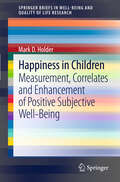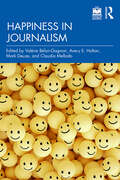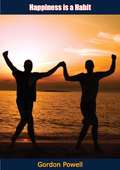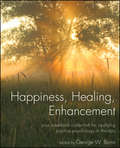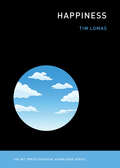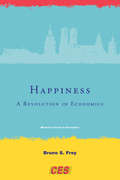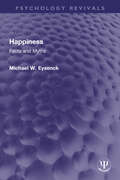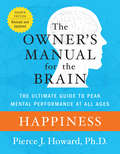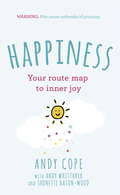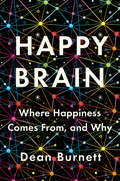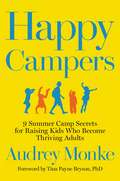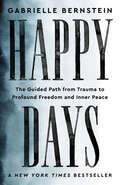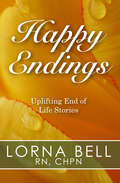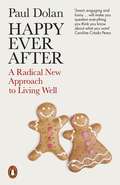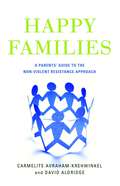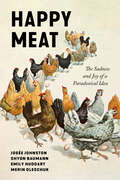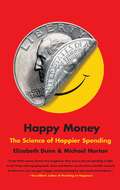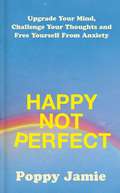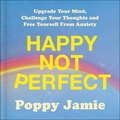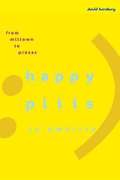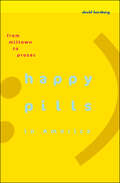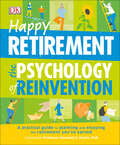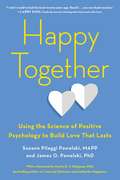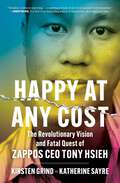- Table View
- List View
Happiness in Children
by Mark D. HolderThis briefs summarizes the research on positive well-being in children, with a particular focus on their happiness. It starts with a discussion of the constructs of positive psychology (i.e., well-being, happiness and life satisfaction), and then outlines the research that shows the importance of studying well-being. Next, it explores how researchers measure happiness and what these measures tell us about whether children are happy and how their happiness differs from adults. Following this, it discusses current positive psychology theories with the aim of suggesting their promise in understanding children's well-being. Next, it examines the importance of individual differences, including culture and temperament. Because studies have only recently identified several of the factors associated with children's happiness, the book ends with a discussion of how we might enhance children's well-being and suggests directions for future research.
Happiness in Journalism
by Mark Deuze Claudia Mellado Valérie Bélair-Gagnon Avery E. HoltonThis book examines how journalism can overcome harmful institutional issues such as work-related trauma and precarity, focusing specifically on questions of what happiness in journalism means, and how one can be successful and happy on the job. Acknowledging profound variations across people, genres of journalism, countries, types of news organizations, and methodologies, this book brings together an array of international perspectives from academia and practice. It suggests that there is much that can be done to improve journalists’ subjective well-being, despite there being no one-size-fits-all solution. It advocates for a shift in mindset as much in theoretical as in methodological approaches, moving away from a focus on platforms and adaptation to pay real attention to the human beings at the center of the industry. That shift in mindset and approach involves exploring what happiness is, how happiness manifests in journalism and media industries, and what future we can imagine that would be better for the profession. Happiness is conceptualized from both psychological and philosophical perspectives. Issues such as trauma, harassment, inequality, digital security, and mental health are considered alongside those such as precarity, recruitment, emotional literacy, intelligence, resilience, and self-efficacy. Authors point to norms, values and ethics in their regions and suggest best practices based on their experience. Constituting a first-of-its-kind study and guide, Happiness in Journalism is recommended reading for journalists, educators, and advanced students interested in topics relating to journalists’ mental health and emotion, media management, and workplace well-being. This book is accompanied by an online platform which supports videos, exercises, reports and links to useful further reading.
Happiness is a Habit
by Gordon PowellThe most dominating goal of the average person today is to find happiness.Clergymen, doctors, sociologists and specialists in human nature will generally agree that the above statement accurately reflects the times. A famous author-minister—Gordon Powell—has written an inspirational book based on the above statement.Gordon Powell was minister of St. Stephen’s Presbyterian Church in Sydney, Australia. One unique aspect of this church was the lunch-hour service every Wednesday for professional and business people. This service was broadcast by eighteen radio stations, in four states of the continent, to an area covering ninety per cent of the population. It was also shown on television in the areas of Sydney, Melbourne and Adelaide. St. Stephen’s claimed the largest attendance of any Protestant church in Australia.Another spiritually creative feature of Gordon Powell’s ministry is the “Faith Builder” cards, over a million of which have been printed and distributed. The cards contain both a scriptural guide for living, plus a modern interpretation or adaptation of the Biblical wisdom. Each of the twelve chapters in Happiness Is A Habit ends with a “Faith Builder,” and these “Faith Builders” are printed again in a separate section at the end of the book in case you should want to clip them out for personal use.Happiness is a Habit digs into the heart of today’s complexities, offering helpful guidance and spiritual nourishment to the reader.“A sensible philosophy of life, based on the teaching of the Sermon on the Mount, and teaching that the secret of happiness lies in right thinking and in the application of a positive faith to everyday life.”—The Times Literary Supplement
Happiness, Healing, Enhancement
by Burns George W.Praise for Happiness, Healing, Enhancement "Filled with good strategies based in research, compelling case material, and most importantly, practical advice, this book belongs in the library of everyone interested in what it means to live well. It provides not only ample food for thought, but for action. " -Christopher Peterson, Professor of Psychology, University of Michigan "If you are a therapist, a coach-or if you want to help yourself and others flourish-then this book is a must-read. It is an important theoretical and practical contribution to the field of positive psychology-and, in fact, to the field of psychology as a whole. " -Tal Ben-Shahar, author of Happier and The Pursuit of Perfect A practical guide to applying the principles of positive psychology in your mental health practice Edited by internationally recognized psychologist, author, and therapist trainer George Burns, Happiness, Healing, Enhancement: Your Casebook Collection for Applying Positive Psychology in Therapy provides thought-provoking yet realistic and practical contributions from practitioners of positive psychology from around the world who share how they have translated solid, positive psychology research into sound clinical practice. Organized to make searching for a particular diagnostic category or therapeutic outcome fast and easy, this guide features: Contributions from some of the world's foremost positive psychology clinicians, researchers, and teachers, including P. Alex Linley, Betty Alice Erickson, Robert Weis, Antonella Delle Fave, Richard G. Tedeschi, Robert Biswas-Diener, Michael D. Yapko, and Bill O'Hanlon Examples and strategies including a "Putting It into Practice" feature that illustrates how readers can immediately apply the therapeutic applications covered in each chapter Building on the proven benefits of the positive psychology movement, Happiness, Healing, Enhancement will teach you new skills that will strengthen your practice of therapy and equip your clients with the pathways to overcome challenging problems and live a full, satisfying life.
Happiness: A Cross-cultural Lexicon Of Well-being (The MIT Press Essential Knowledge series)
by Tim LomasA concise and engaging exploration of how we understand happiness.What does it mean to feel happiness? As a state of mind, it&’s elusive. As a concept—despite the plethora of pop psychology books on the subject—it&’s poorly understood. In this volume in the MIT Press Essential Knowledge series, psychologist Tim Lomas offers a concise and engaging overview of our current understanding of happiness. Lomas explains that although the field of positive psychology, which focuses on happiness, emerged only in the last twenty-five years, interest in the meaning of happiness goes back several millennia. Drawing on a variety of disciplines, from philosophy and sociology to economics and anthropology, Lomas offers an expansive vision of what happiness means, exploring a significant range of experiential territory. After considering such related concepts as wellbeing and flourishing, Lomas traces ideas of happiness from the ancient Buddhist notions of sukha and nirvana through Aristotle&’s distinction between hedonic and eudaemonic happiness to today&’s therapeutic and scientific approaches. He discusses current academic perspectives, looking at the breadth of happiness research across disciplines; examines the mechanics of happiness—the physiological, psychological, phenomenological, and sociocultural processes that make up happiness; explores the factors that influence happiness, both individual and social; and discusses the cultivation of happiness.
Happiness: A Revolution in Economics (Munich Lectures in Economics)
by Bruno S. FreyA leading economist discusses the potential of happiness research (the quantification of well-being) to answer important questions that standard economics methods are unable to analyze.Revolutionary developments in economics are rare. The conservative bias of the field and its enshrined knowledge make it difficult to introduce new ideas not in line with received theory. Happiness research, however, has the potential to change economics substantially in the future. Its findings, which are gradually being taken into account in standard economics, can be considered revolutionary in three respects: the measurement of experienced utility using psychologists' tools for measuring subjective well-being; new insights into how human beings value goods and services and social conditions that include consideration of such non-material values as autonomy and social relations; and policy consequences of these new insights that suggest different ways for government to affect individual well-being. In Happiness, emphasizing empirical evidence rather than theoretical conjectures, Bruno Frey substantiates these three revolutionary claims for happiness research. After tracing the major developments of happiness research in economics and demonstrating that we have gained important new insights into how income, unemployment, inflation, and income demonstration affect well-being, Frey examines such wide-ranging topics as democracy and federalism, self-employment and volunteer work, marriage, terrorism, and watching television from the new perspective of happiness research. Turning to policy implications, Frey describes how government can provide the conditions for people to achieve well-being, arguing that a crucial role is played by adequate political institutions and decentralized decision making. Happiness demonstrates the achievements of the economic happiness revolution and points the way to future research.
Happiness: Facts and Myths (Psychology Revivals)
by Michael W EysenckFirst published in 1990, Happiness is based fairly and squarely on scientific evidence and provides realistic insights into the following questions: What is happiness? How can you tell if you are happy? How important are love, sex, money, and family relationships? Can happiness last? Is there a blueprint for happiness? Is unhappiness a terminal illness? Is there a ‘happiness gone’? This book will be of interest to students of psychology and other mental health experts.
Happiness: The Owner's Manual
by Pierce HowardCutting-edge, user-friendly, and comprehensive: the revolutionary guide to the brain, now fully revised and updatedAt birth each of us is given the most powerful and complex tool of all time: the human brain. And yet, as we well know, it doesn't come with an owner's manual--until now. In this unsurpassed resource, Dr. Pierce J. Howard and his team distill the very latest research and clearly explain the practical, real-world applications to our daily lives. Drawing from the frontiers of psychology, neurobiology, and cognitive science, yet organized and written for maximum usability, The Owner's Manual for the Brain, Fourth Edition, is your comprehensive guide to optimum mental performance and well-being. It should be on every thinking person's bookshelf. What are the ingredients of happiness? Which are the best remedies for headaches and migraines? How can we master creativity, focus, decision making, and willpower? What are the best brain foods? How is it possible to boost memory and intelligence? What is the secret to getting a good night's sleep? How can you positively manage depression, anxiety, addiction, and other disorders? What is the impact of nutrition, stress, and exercise on the brain? Is personality hard-wired or fluid? What are the best strategies when recovering from trauma and loss? How do moods and emotions interact? What is the ideal learning environment for children? How do love, humor, music, friendship, and nature contribute to well-being? Are there ways of reducing negative traits such as aggression, short-temperedness, or irritability? What is the recommended treatment for concussions? Can you delay or prevent Alzheimer's and dementia? What are the most important ingredients to a successful marriage and family? What do the world's most effective managers know about leadership, motivation, and persuasion? Plus 1,000s more topics!
Happiness: Your route-map to inner joy
by Andy CopeHappiness, calm and enlightenment need not be elusive concepts which we hear of in theory but are never able to capture. This funny, practical book by Andy Cope, the Dr of Happiness, will show you how to transform your thinking, change gear and find a fresh new perspective that will leave you better focused on the things that matter, healthier and a great deal happier.ABOUT THIS SERIESLittle Books are accessible and engaging books with a focus on personal development and business topics, delivering quick, outcome-focused results, ideal for self-improvement junkies, commuters, or business readers.
Happiness: Your route-map to inner joy
by Andy Whittaker Andy Cope Shonette Bason-WoodHappiness, calm and enlightenment need not be elusive concepts which we hear of in theory but are never able to capture. This funny, practical book by Andy Cope, the UK's first Dr of Happiness, will show you how to transform your thinking, change gear and find a fresh new perspective that will leave you better focused on the things that matter, much healthier and a great deal happier.Happiness is the definitive route map that shows you not only where, but also how. It teaches you to harness your thoughts, memories, ideas and attention to embrace 'now', experience more joy and live a truly flourishing life.This book is a wake-up call to stop skimming the surface of life, take charge of your attitude and set your path for enlightenment.Buckle up. You can expect peril, thrills, science and lots of laughter along the way.
Happy Brain: Where Happiness Comes From, And Why
by Dean BurnettNeuroscientist Dean Burnett dives into the squishy science and bubbly feelings of what happiness means. The pursuit of happiness is one of the most common and enduring quests of human life. It’s what drives us to get a job, fall in love, watch stand-up comedy, go to therapy, have questionable obsessions, and come home at the end of the day. But where does happiness come from, and why do we need it so much? Is lasting, permanent happiness possible—or should it be? And what does any of this have to do with the brain? In this delightful sequel to Idiot Brain, Dean Burnett explores these questions from a neuroscientific perspective. He combines the latest research and theories about how the brain works with interviews and contributions from relevant individuals, such as relationship experts, psychology professors, comedy writers, celebrities, millionaire gurus, and pretty much anyone else involved in bringing about happiness in others. Distinguished by Burnett’s signature wit and curiosity, Happy Brain elucidates our understanding of what happiness actually is, where it comes from, and what exactly is going on in our brains when we’re in a cheery state. Humorous and enlightening, Happy Brain explores a fascinating aspect of modern neuroscience and, in the process, reveals something about what it means to be human.
Happy Campers: 9 Summer Camp Secrets for Raising Kids Who Become Thriving Adults
by Audrey MonkeAudrey "Sunshine" Monke, mother of five and camp owner-director, shares nine powerful parenting techniques-inspired by the research-based practices of summer camp-to help kids thrive and families become closer. Research has proven that kids are happier and gain essential social and emotional skills at camp. A recognized parenting expert, Audrey Monke distills what she's learned from thousands of interactions with campers, camp counselors, and parents, and from her research in positive psychology, to offer intentional strategies parents can use to foster the benefits of camp at home. Our screen-obsessed, competitive society makes it harder than ever to raise happy, thriving kids. But there are tried-and-true methods that can help. Instead of rearing a generation of children who are overwhelmed, anxious, depressed, and who struggle to become independent, responsible adults, parents can create a culture that promotes the growth of important character traits and the social skills kids need for meaningful, successful lives. Thousands of parents attest to the "magical" benefits of summer camp for their kids, noting their children return more joyful, positive, confident, and resilient after just a few weeks. But you can learn exactly what it takes to promote these benefits at home. Complete with specific ideas to implement the most effective summer camp secrets, HAPPY CAMPERS is a one of a kind resource for raising happy, socially intelligent, successful kids.
Happy Days: The Guided Path from Trauma to Profound Freedom and Inner Peace
by Gabrielle BernsteinA ** NEW YORK TIMES BESTSELLER! ** IF YOU WERE FREE FROM FEAR, WHO WOULD YOU HAVE THE FREEDOM TO BE? In Happy Days, #1 New York Times best-selling author Gabrielle Bernstein charts a clear path to releasing inner child wounds, unlearning fear, and remembering love so you can enjoy inner peace every day.What if you could wake up every day without anxiety? View your past with purpose, not regret? Live happy, peaceful, and free from fear? You can be the happiest person you know—and Gabrielle Bernstein will show you how.Gabby has long been loved as a spiritual teacher speaking to tens of thousands in sold-out venues throughout the world, and catalyst for profound inner change. Happy Days presents her most powerful teaching yet: a plan for transforming the pain of your past traumas, whatever that may be, into newfound strength and freedom.In this empowering book for releasing trauma, you&’ll learn: Why most people feel frozen in mental health patterns that make them unhappy—and what to do about it9 transformational, yet untapped, techniques for peace and genuine happiness—from &“reparenting&” yourself to bodywork practices that work for freeing the stuck energy of past unprocessed trauma from your bodyThe mindset shift that can do more for you than decades of personal workHow to speak the unspeakable and go into the places that scare you—and come away with peace of mind and freer than ever before!"This book is a game-changer filled with honesty and openness. The vulnerability Gabby offers within the pages of Happy Days will make you feel less alone." -Dr. Shefali TsabaryNew York Times bestselling author and clinical psychologistChapter Titles Include: Willing to Become Free Become Brave Enough to Wonder Why We Run Hiding behind the BodySpeaking the UnspeakableDon't Call Me CrazyLove Every PartFreeing What's FrozenReparenting YourselfHappy Days Ahead &“This book is my gift to you,&” Gabby writes. &“It will answer your questions about why you feel blocked, scared, anxious, depressed, or alone, and it will liberate you from the belief system that has kept you small for so long. . . . By taking this path you will become the best version of yourself. You will become new.&”No matter what you've been through in life, you can have a future filled with freedom, inner peace and happy days.
Happy Endings: Uplifting End of Life Stories
by Lorna BellHappy Endings is a collection of forty stories about people who said good-bye in unique and uplifting ways. This is not to say their narratives—generously shared with the author by families and caregivers—are without pain and sorrow. Yet, the final stage of life holds remarkable possibilities to strengthen bonds between loved ones and confirm our faith in the hereafter. An elderly woman prepares a magnificent deathbed of rose petals from bouquets in her sickroom . . . a young boy climbs aboard a pony only he and his mother can see . . . a delirious man hands his daughter a piece of tissue in the perfect likeness of an angel. Dying is the natural conclusion to life, and these stories invite you to re‑examine your own perception of death. Most of all, they remind us that, while our time here on Earth is temporary, our spiritual existence is not. The publication of Happy Endings led to the discovery of more stories in the same vein and a second volume, More Happy Endings, containing an additional forty-five stories, followed the first. Here, both volumes are brought together in a single package.
Happy Ever After: Escaping The Myth of The Perfect Life
by Paul Dolan'A passionate, provocative book. It isn't just a self-help book. It is a manifesto for a better society' Sunday Times 'One of the most rigorous articulations of the new mood of acceptance...a persuasive demolition of many of our cultural stories about how we ought to live' Oliver Burkeman, Guardian Paul Dolan, the bestselling author of Happiness by Design, shows us how to escape the myth of perfection and find our own route to happiness. Be ambitious; find everlasting love; look after your health ... There are countless stories about how we ought to live our lives. These narratives can make our lives easier, and they might sometimes make us happier too. But they can also trap us and those around us. In Happy Ever After, bestselling happiness expert Professor Paul Dolan draws on a variety of studies ranging over wellbeing, inequality and discrimination to bust the common myths about our sources of happiness. He shows that there can be many unexpected paths to lasting fulfilment. Some of these might involve not going into higher education, choosing not to marry, rewarding acts rooted in self-interest and caring a little less about living forever. By freeing ourselves from the myth of the perfect life, we might each find a life worth living.
Happy Families
by David Aldridge Carmelite Avraham-KrehwinkelParenting a severely disruptive child can be exhausting and demoralizing to the point where breaking the cycle of bad behaviour seems an impossible task. Happy Families offers a realistic, step-by-step, practical approach to tackling destructive behaviour that helps parents regain control and establish harmony within the family. Using hands-on techniques based on the principles of non-violent resistance, each chapter deals with a different stage of the process - from communicating to the child an unwavering determination that the situation will change and enlisting the support of family and friends, to taking positive action in a way that avoids escalation. General advice such as how to respond constructively and consistently to provocation is included throughout, and morale-boosting tips encourage flagging parents to persevere with the approach. Happy Families will empower despairing parents and caregivers who seek to contain, counter and positively re-direct the aggression they face from children in distress, resulting in deep-felt and lasting change.
Happy Meat: The Sadness and Joy of a Paradoxical Idea (Culture and Economic Life)
by Josee Johnston Shyon Baumann Emily Huddart Kennedy Merin OleschukNorth Americans love eating meat. Despite the increased awareness of the meat industry's harms–violence against animals, health problems, and associations with environmental degradation–the rate of meat eating hasn't changed significantly in recent years. Instead, what has emerged is an uncomfortable paradox: a need to square one's values with the behaviors that contradict those values. Using a large-scale, multidimensional, and original dataset, Happy Meat explores the thoughts and emotions that underpin our moral decision-making in this meat paradox. Conscientious meat-eaters turn to the notion of "happy meat" to make sense of their behaviors by consuming meat they see as more healthy, ethical, and sustainable. Happy meat might be labeled grass fed, free-range, antibiotic free, naturally raised, or humane. The people who produce and consume it, together, make up the complex landscape of conscientious meat-eating in modern Western societies. The discourse of happy meat ultimately may not be a sufficient response to all the critiques of meat eating, rife as it is with contradictions. However, it offers a powerful case for understanding how moral boundaries and notions of the 'good eater' are constructed through negotiations of values, identity, and status.
Happy Money: The Science of Happier Spending
by Michael Norton Elizabeth DunnTwo professors combine their fascinating and cutting-edge research in behavioral science to explain how money can buy happiness--if you follow five core principles of smart spending.Most people recognize that they need professional advice on how to earn, save, and invest their money. When it comes to spending that money, most people just follow their intuitions. But scientific research shows that those intuitions are often wrong.Happy Money offers a tour of research on the science of spending, explaining how you can get more happiness for your money. Authors Elizabeth Dunn and Michael Norton have outlined five principles--from choosing experiences over stuff to spending money on others--to guide not only individuals looking for financial security, but also companies seeking to create happier employees and provide "happier products" to their customers. Dunn and Norton show how companies from Google to Pepsi to Charmin have put these ideas into action.Along the way, Dunn and Norton explore fascinating research that reveals that luxury cars often provide no more pleasure than economy models, that commercials can actually enhance the enjoyment of watching television, and that residents of many cities frequently miss out on inexpensive pleasures in their hometowns. By the end of this "lively and engaging book" (Dan Gilbert, author of Stumbling on Happiness), you'll be asking yourself one simple question every time you reach for your wallet: Am I getting the biggest happiness bang for my buck?
Happy Not Perfect: Upgrade Your Mind, Challenge Your Thoughts and Free Yourself From Anxiety
by Poppy JamieEven before the pandemic brought on a crushing wave of stress, anxiety, isolation and financial struggle, there was a growing mental health crisis - exacerbated by a digital-first culture that is putting untold pressure on a generation of young people. Poppy Jamie has made it her life's mission to do something about this and share the actionable, science-backed solutions we can all use to rewire our daily thoughts and break damaging patterns for good - those same ones that she used to piece herself back together after suffering from chronic anxiety and burnout. Happy Not Perfect, the book, sets out her 'Four-Step Flex Framework' that will enable readers to bend and stretch their negative thought pathways into better shape, unravel their emotional blockages, raise their energy levels, move through challenges with confidence and create a life aligned with their deepest values and aspirations. Blending cutting-edge science from the world's leading experts, straight-talking spirituality and the very soul of Poppy's own experiences. She is an author who's been there and wants to equip us with the tools, knowledge and methods we can use to navigate our hardest days, become adaptable, re-write old habits and fears and snap us out of autopilot, to start building a brighter future. *Poppy says 'The Flex is about committing to compassionate action to change our realities. Life will never be perfect, and our happiness lies in the beautiful acceptance of that. This book is about digging deeper into our psyche to heal the root of our thinking and as we all carry emotional wounds, micro or macro, taking the time to understand the root of the stories we tell ourselves, is essential in rewriting new scripts moving forward.*"Poppy is one of my favourite voices in the world, always in pursuit of understanding, information, and empathy." - Jameela Jamil *"For the past four years Poppy has been campaigning for better mental well-being education and accessible tools - she is inspirational and makes complex problems easy to understand." - Suki Waterhouse
Happy Not Perfect: Upgrade Your Mind, Challenge Your Thoughts and Free Yourself From Anxiety
by Poppy JamieFusing the very best of self help, science and spirituality, Happy Not Perfect teaches us how to SHIFT our emotional wellbeing into a happier, balanced and less anxious state.Even before the pandemic brought on a crushing wave of stress, anxiety, isolation and financial struggle, there was a growing mental health crisis - exacerbated by a digital-first culture that is putting untold pressure on a generation of young people. Poppy Jamie has made it her life's mission to do something about this and share the actionable, science-backed solutions we can all use to rewire our daily thoughts and break damaging patterns for good - those same ones that she used to piece herself back together after suffering from chronic anxiety and burnout. Happy Not Perfect, the book, sets out her 'Four-Step Flex Framework' that will enable readers to bend and stretch their negative thought pathways into better shape, unravel their emotional blockages, raise their energy levels, move through challenges with confidence and create a life aligned with their deepest values and aspirations. Blending cutting-edge science from the world's leading experts, straight-talking spirituality and the very soul of Poppy's own experiences. She is an author who's been there and wants to equip us with the tools, knowledge and methods we can use to navigate our hardest days, become adaptable, re-write old habits and fears and snap us out of autopilot, to start building a brighter future. *Poppy says 'The Flex is about committing to compassionate action to change our realities. Life will never be perfect, and our happiness lies in the beautiful acceptance of that. This book is about digging deeper into our psyche to heal the root of our thinking and as we all carry emotional wounds, micro or macro, taking the time to understand the root of the stories we tell ourselves, is essential in rewriting new scripts moving forward.*"Poppy is one of my favourite voices in the world, always in pursuit of understanding, information, and empathy." - Jameela Jamil *"For the past four years Poppy has been campaigning for better mental well-being education and accessible tools - she is inspirational and makes complex problems easy to understand." - Suki Waterhouse(P) 2021 Hodder & Stoughton Ltd
Happy Pills In America: From Miltown To Prozac
by David HerzbergValium. Paxil. Prozac. Prescribed by the millions each year, these medications have been hailed as wonder drugs and vilified as numbing and addictive crutches. Where did this "blockbuster drug" phenomenon come from? What factors led to the mass acceptance of tranquilizers and antidepressants? And how has their widespread use affected American culture? David Herzberg addresses these questions by tracing the rise of psychiatric medicines, from Miltown in the 1950s to Valium in the 1970s to Prozac in the 1990s. The result is more than a story of doctors and patients. From bare-knuckled marketing campaigns to political activism by feminists and antidrug warriors, the fate of psychopharmacology has been intimately wrapped up in the broader currents of modern American history. Beginning with the emergence of a medical marketplace for psychoactive drugs in the postwar consumer culture, Herzberg traces how "happy pills" became embroiled in Cold War gender battles and the explosive politics of the "war against drugs"—and how feminists brought the two issues together in a dramatic campaign against Valium addiction in the 1970s. A final look at antidepressants shows that even the Prozac phenomenon owed as much to commerce and culture as to scientific wizardry. With a barrage of "ask your doctor about" advertisements competing for attention with shocking news of drug company malfeasance, Happy Pills is an invaluable look at how the commercialization of medicine has transformed American culture since the end of World War II.
Happy Pills in America: From Miltown to Prozac
by David HerzbergValium. Paxil. Prozac. Prescribed by the millions each year, these medications have been hailed as wonder drugs and vilified as numbing and addictive crutches. Where did this "blockbuster drug" phenomenon come from? What factors led to the mass acceptance of tranquilizers and antidepressants? And how has their widespread use affected American culture? David Herzberg addresses these questions by tracing the rise of psychiatric medicines, from Miltown in the 1950s to Valium in the 1970s to Prozac in the 1990s. The result is more than a story of doctors and patients. From bare-knuckled marketing campaigns to political activism by feminists and antidrug warriors, the fate of psychopharmacology has been intimately wrapped up in the broader currents of modern American history. Beginning with the emergence of a medical marketplace for psychoactive drugs in the postwar consumer culture, Herzberg traces how "happy pills" became embroiled in Cold War gender battles and the explosive politics of the "war against drugs"—and how feminists brought the two issues together in a dramatic campaign against Valium addiction in the 1970s. A final look at antidepressants shows that even the Prozac phenomenon owed as much to commerce and culture as to scientific wizardry.With a barrage of "ask your doctor about" advertisements competing for attention with shocking news of drug company malfeasance, Happy Pills is an invaluable look at how the commercialization of medicine has transformed American culture since the end of World War II.
Happy Retirement: A Practical Guide to Planning and Enjoying the Retirement You’ve Earned
by DKA practical, fully illustrated guide to planning and enjoying retirement, grounded in psychological research.Retirement can bring immense fulfillment but also can be a source of stress, especially today. Retirement: The Psychology of Reinvention uses psychological research and a unique visual style of infographics and illustrations to provide readers with a retirement roadmap just right for them.Fully illustrated, with constructive advice for all retirees — whatever the age and circumstances — and inspirational guidance from a wealth of sources, Retirement: The Psychology of Reinvention answers all the questions readers are likely to ask at any stage of retirement.
Happy Together: Using the Science of Positive Psychology to Build Love That Lasts
by Suzann Pileggi Pawelski James O. PawelskiHow do you get to “happily ever after”? In fairy tales, lasting love just happens. But in real life, healthy habits are what build happiness over the long haul. Happy Together, written by positive psychology experts and husband-and-wife team Suzann Pileggi Pawelski and James O. Pawelski, is the first book on using the principles of positive psychology to create thriving romantic relationships. Combining extensive scientific research and real-life examples, this book will help you find and feed the good in yourself and your partner. You will learn to develop key habits for building and sustaining long-term love by: • Promoting a healthy passion • Prioritizing positive emotions • Mindfully savoring experiences together • Seeking out strengths in each other Through easy-to-follow methods and fun exercises, you’ll learn to strengthen your partnership, whether you’re looking to start a relationship off on the right foot, weather difficult times, reignite passion, or transform a good marriage into a great one.
Happy at Any Cost: The Revolutionary Vision and Fatal Quest of Zappos CEO Tony Hsieh
by Kirsten Grind Katherine SayreFrom award-winning Wall Street Journal reporters, &“a startling portrait of one of our greatest tech visionaries, Zappos CEO Tony Hsieh&” (Robert Kolker, author of Hidden Valley Road), reporting on his short life and untimely death and what they mean for our culture&’s pursuit of happiness.Tony Hsieh—CEO of Zappos, Las Vegas developer, and all-around beloved entrepreneur—was famous for spreading happiness. He lived and breathed this philosophy, instilling an ethos of joy at his company and outlining his vision for a better workplace in his New York Times bestseller Delivering Happiness. He promoted a workplace where bosses treated employees like family members, where stress was replaced by playfulness, and where hierarchies were replaced with equality and collaboration. His outlook shaped Silicon Valley and the larger business world. Hsieh used his position at work to integrate levity into a normally competitive environment. He aspired to build his own utopian cities, pouring millions of dollars into real estate and small businesses, first in downtown Las Vegas, Nevada—where Zappos was headquartered—and then in Park City, Utah. He gave generously to his employees and close friends, including throwing infamous Zappos parties and organizing gatherings at his home, an Airstream trailer park. When Hsieh died suddenly in November of 2020, the news shook the business and tech world. Wall Street Journal reporters Kirsten Grind and Katherine Sayre quickly realized the importance of the story because of Hsieh&’s stature in the industry, but as they dug into the details of his final months, they realized there was a bigger story to tell. They found that Hsieh&’s obsession with happiness masked his darker struggles with addiction, mental health, and loneliness. In the last year of his life, he spiraled out of control, cycling out of rehab and into the waiting arms of friends who enabled his worst behavior, even as he bankrolled them from his billion-dollar fortune. Happy at Any Cost sheds light on one of the most venerated, yet vulnerable, business leaders of our time. It's about our culture&’s intense need to find &“happiness&” at all costs, our misguided worship of entrepreneurs, the stigmas still surrounding mental health, and how the trappings of fame can mask all types of deeper problems. In turn, it reveals how we conceptualize success—and define happiness—in our modern age.
